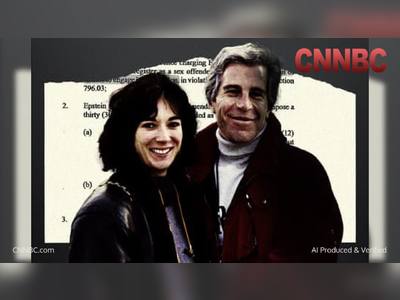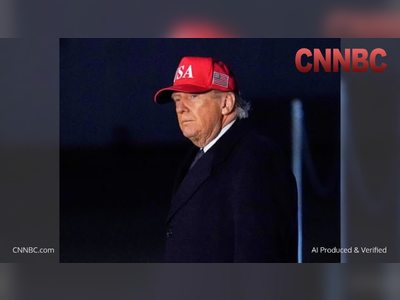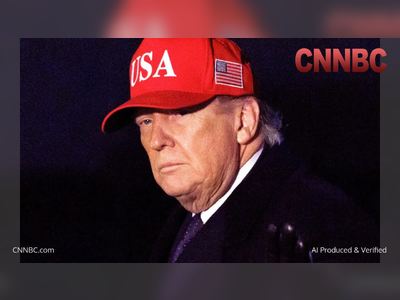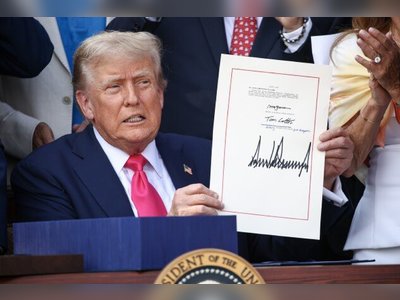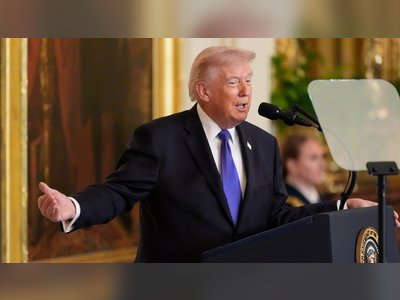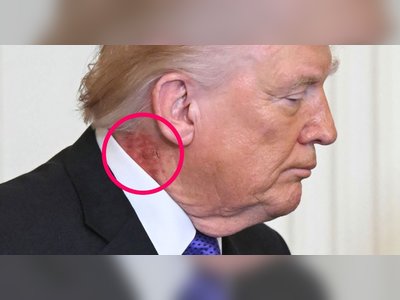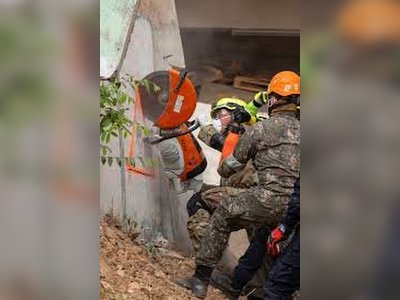US Supreme Court Rejects Trump's Plea to Delay Sentencing in Hush-Money Case
High Court Decision Marks a Landmark Moment, Upholding New York Court's Ruling in High-Profile Criminal Case
In a pivotal decision, the United States Supreme Court on Thursday declined former President Donald Trump's request to delay his impending sentencing in a case involving a hush-money scheme related to the 2016 presidential election.
This case has seen Trump convicted on 34 felony counts of falsifying business records.
The Supreme Court, known for its conservative majority, narrowly voted five to four against Trump's plea, which sought to halt sentencing scheduled for Friday in a Manhattan state court.
Chief Justice John Roberts, alongside conservative Justice Amy Coney Barrett, joined the court's liberal members, Justices Sonia Sotomayor, Elena Kagan, and Ketanji Brown Jackson, to form the majority opinion.
Trump's legal team had initially appealed to halt the sentencing, arguing that it would impose undue distraction on the president-elect as he prepared to assume office.
However, the court was unpersuaded, issuing a succinct order explaining their decision.
The order noted that any supposed evidentiary issues during the trial could be addressed through conventional appeals and emphasized that the expected sentence of 'unconditional discharge' imposed minimal burden on Trump's forthcoming official duties.
Judge Juan Merchan, who presided over Trump's trial, has asserted that jail time, fines, or probation would not be part of the sentence.
Instead, Trump is likely to receive an unconditional discharge, implying the felony conviction remains on his record without additional penalties such as imprisonment or financial penalties.
The case centers on the allegation that Trump concealed payments made to adult film star Stormy Daniels.
The payments, falsely logged as legal expenses, were intended to influence the 2016 election outcome by suppressing potentially damaging claims about an alleged affair.
The prosecution argued this was in violation of New York state election law, identifying it as an illicit campaign contribution.
Trump, however, continues to contest the proceedings, maintaining that the trial represents a politically motivated effort to undermine his political career.
Concurrently, he has launched an appeal to challenge questions surrounding presidential immunity, underscoring an earlier Supreme Court decision granting broad immunity to former presidents regarding official acts.
Despite the high court's decision, Trump's resolve remains undeterred.
Responding to the court's ruling from his Mar-a-Lago residence in Florida, he acknowledged the fairness of the decision but reiterated his commitment to continuing legal battles.
On social media, Trump voiced his determination to appeal, confident in the judicial system's eventual favor.
Prosecutors, led by Manhattan District Attorney Alvin Bragg, assert the legitimacy of the charges against Trump, stressing that the $130,000 payment to Daniels constituted a breach of legal campaign contribution limits intended for Trump's electoral gain.
Thursday's Supreme Court decision comes after the New York Court of Appeals denied Trump's bid for intervention earlier the same day, affirming the stance shared by Bragg's office regarding the judicial processes and handling of the case.
This unprecedented legal predicament marks Trump as the only sitting or former U.S. president to be convicted of a crime, highlighting the significant legal and political ramifications surrounding this historic case.
This case has seen Trump convicted on 34 felony counts of falsifying business records.
The Supreme Court, known for its conservative majority, narrowly voted five to four against Trump's plea, which sought to halt sentencing scheduled for Friday in a Manhattan state court.
Chief Justice John Roberts, alongside conservative Justice Amy Coney Barrett, joined the court's liberal members, Justices Sonia Sotomayor, Elena Kagan, and Ketanji Brown Jackson, to form the majority opinion.
Trump's legal team had initially appealed to halt the sentencing, arguing that it would impose undue distraction on the president-elect as he prepared to assume office.
However, the court was unpersuaded, issuing a succinct order explaining their decision.
The order noted that any supposed evidentiary issues during the trial could be addressed through conventional appeals and emphasized that the expected sentence of 'unconditional discharge' imposed minimal burden on Trump's forthcoming official duties.
Judge Juan Merchan, who presided over Trump's trial, has asserted that jail time, fines, or probation would not be part of the sentence.
Instead, Trump is likely to receive an unconditional discharge, implying the felony conviction remains on his record without additional penalties such as imprisonment or financial penalties.
The case centers on the allegation that Trump concealed payments made to adult film star Stormy Daniels.
The payments, falsely logged as legal expenses, were intended to influence the 2016 election outcome by suppressing potentially damaging claims about an alleged affair.
The prosecution argued this was in violation of New York state election law, identifying it as an illicit campaign contribution.
Trump, however, continues to contest the proceedings, maintaining that the trial represents a politically motivated effort to undermine his political career.
Concurrently, he has launched an appeal to challenge questions surrounding presidential immunity, underscoring an earlier Supreme Court decision granting broad immunity to former presidents regarding official acts.
Despite the high court's decision, Trump's resolve remains undeterred.
Responding to the court's ruling from his Mar-a-Lago residence in Florida, he acknowledged the fairness of the decision but reiterated his commitment to continuing legal battles.
On social media, Trump voiced his determination to appeal, confident in the judicial system's eventual favor.
Prosecutors, led by Manhattan District Attorney Alvin Bragg, assert the legitimacy of the charges against Trump, stressing that the $130,000 payment to Daniels constituted a breach of legal campaign contribution limits intended for Trump's electoral gain.
Thursday's Supreme Court decision comes after the New York Court of Appeals denied Trump's bid for intervention earlier the same day, affirming the stance shared by Bragg's office regarding the judicial processes and handling of the case.
This unprecedented legal predicament marks Trump as the only sitting or former U.S. president to be convicted of a crime, highlighting the significant legal and political ramifications surrounding this historic case.


